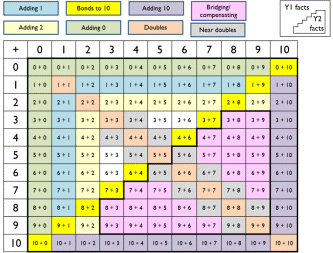At All Saints’ CE Federation, our mathematics curriculum is designed to nurture a love of learning and empower every child with the knowledge, skills, and confidence to succeed in mathematics. Our vision is that children will be fluent in the basic skills of mathematics including additive facts and multiplication facts. Grounded in the principles of the National Curriculum for England and aligned with the NCETM/White Rose programmes, we ensure a high-quality maths education that equips pupils with the tools to reason, problem-solve, and think mathematically.
In EYFS, we use a mastery approach to build strong foundations in number. Our focus is on developing secure knowledge of numbers to 10, exploring their composition, relationships, and patterns. Using practical resources such as ten frames, counters, and cubes, children gain a deep, hands-on understanding of maths. Maths is embedded across all areas of provision, both indoors and outdoors, enabling children to explore and apply mathematical concepts in meaningful, playful contexts. By the time they leave us in Year 6, children will have covered the topics of number, place value, addition, subtraction, multiplication, division, fractions, decimals and percentages, measurement, geometry, statistics.
At All Saints’ CE Federation we use a mastery approach (we develop fluency without resorting to rote learning and enabling children to solve non-routine maths problems without having to memorise procedures) and the CPA (concrete, pictorial and abstract) Approach. Children are introduced to a new topic with concrete apparatus, they are then shown the new concept through visual representations and finally they move into the abstract.
Each lesson is delivered using a six part structure
| Memory Lane (ks1)/ Fab 5 (ks2) | Children are given 5 minutes to complete 5 basic skills questions, recapping arithmetic and previous learning regularly. |
| Investigate | Children briefly use a skill which will feed into the maths lesson. They have the opportunity to explore this concept using concrete apparatus and pictorial representations if they wish to use these. |
| Let’s Learn | The children will be introduced to the objective of the maths lesson. |
| Guided Practice | Children will work with a partner to complete an activity linked to the maths lesson. The teacher will acknowledge during this time who the struggling learners are and provide these children with scaffolding for the session and also who the rapid graspers are and ensure that these children are challenged during the session. |
| Independent Learning | Children will work on an activity on their own. The questioning within the activity will get progressively harder and rapid graspers will be asked to start further down in the questioning in order to allow them to be challenged through reasoning and problem solving activities. All children will access reasoning and problem solving activities by the end of the lesson. |
| Plenary | The aims of the lesson are reviewed and children’s learning is consolidated. |
Additive facts
By the end of year 1, children should know the answers to the additive facts within the ladder. They should not have to count on their fingers to answer these questions but should instead know the answers off by heart or be able to use a strategy to help them answer the question. By the end of year 2 all children should know the additive facts within the grid. Once children are confident with these facts, they will learn the subtraction facts which go with them.

By the end of year 4, children should know all of their multiplication facts up to 12 x 12. All year four children have their multiplication skills formally tested in the Summer Term of Year 4. The Multiplication Tables Check (MTC) was officially announced by the Department for Education (DFE) in September 2017.
.How will the children be tested?
https://www.ncetm.org.uk/ this is a government funded body teaching for mastery maths. This can be used for all year groups and Number Blocks, which is used in EYFS can be found here.
All Saints Federation Calculation Policy Multiplication and Division 2024
All Saints Federation Calculation Policy 2024
Click on the links below for year group objectives and progression of basic skills
| Cookie | Duration | Description |
|---|---|---|
| cookielawinfo-checkbox-advertisement | 1 year | Set by the GDPR Cookie Consent plugin, this cookie is used to record the user consent for the cookies in the "Advertisement" category . |
| cookielawinfo-checkbox-analytics | 11 months | This cookie is set by GDPR Cookie Consent plugin. The cookie is used to store the user consent for the cookies in the category "Analytics". |
| cookielawinfo-checkbox-functional | 11 months | The cookie is set by GDPR cookie consent to record the user consent for the cookies in the category "Functional". |
| cookielawinfo-checkbox-necessary | 11 months | This cookie is set by GDPR Cookie Consent plugin. The cookies is used to store the user consent for the cookies in the category "Necessary". |
| cookielawinfo-checkbox-others | 11 months | This cookie is set by GDPR Cookie Consent plugin. The cookie is used to store the user consent for the cookies in the category "Other. |
| cookielawinfo-checkbox-performance | 11 months | This cookie is set by GDPR Cookie Consent plugin. The cookie is used to store the user consent for the cookies in the category "Performance". |
| CookieLawInfoConsent | 1 year | Records the default button state of the corresponding category & the status of CCPA. It works only in coordination with the primary cookie. |
| DYNSRV | session | This cookie is used for load balancing purposes to decide which server to send the visitor. |
| viewed_cookie_policy | 11 months | The cookie is set by the GDPR Cookie Consent plugin and is used to store whether or not user has consented to the use of cookies. It does not store any personal data. |
| Cookie | Duration | Description |
|---|---|---|
| CONSENT | 2 years | YouTube sets this cookie via embedded youtube-videos and registers anonymous statistical data. |
| Cookie | Duration | Description |
|---|---|---|
| guest_id | 1 year 1 month | Twitter sets this cookie to identify and track the website visitor. It registers if a user is signed in to the Twitter platform and collects information about ad preferences. |
| VISITOR_INFO1_LIVE | 5 months 27 days | A cookie set by YouTube to measure bandwidth that determines whether the user gets the new or old player interface. |
| YSC | session | YSC cookie is set by Youtube and is used to track the views of embedded videos on Youtube pages. |
| yt-remote-connected-devices | never | YouTube sets this cookie to store the video preferences of the user using embedded YouTube video. |
| yt-remote-device-id | never | YouTube sets this cookie to store the video preferences of the user using embedded YouTube video. |
| yt.innertube::nextId | never | YouTube sets this cookie to register a unique ID to store data on what videos from YouTube the user has seen. |
| yt.innertube::requests | never | YouTube sets this cookie to register a unique ID to store data on what videos from YouTube the user has seen. |
| Cookie | Duration | Description |
|---|---|---|
| VISITOR_PRIVACY_METADATA | 5 months 27 days | Description is currently not available. |

